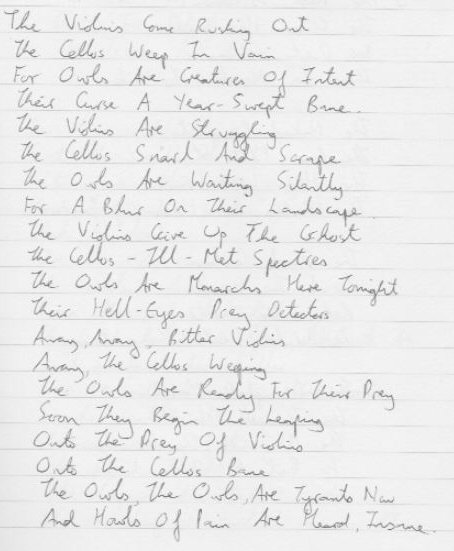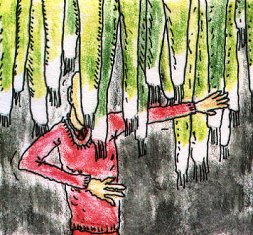Thanks to OutaSpaceman for alerting me to this old magazine advert. Clearly the world o’ catfood advertising has been deprived of Brian’s presence for far too long. He really ought to get back to doing what he does best.
Monthly Archives: June 2013
Further Juvenilia
I hesitate to post this, but what the hell. A second extract from my teenage notebook, this time a terrible poem. Contains owls.
Dabbling With Oranges
Over at The Dabbler this week I round up some amusements of the learned, including Baruch Spinoza’s pastime of setting spiders to fight each other and then laughing immoderately at the result.
There is mention of James Boswell too, which inspired Jonathan Law in the comments to note this intriguing passage from The Life Of Samuel Johnson, LL.D. (1791):
It seems [Johnson] had been frequently observed at the Club to put into his pocket the Seville oranges, after he had squeezed the juice of them into the drink he made for himself. Beauclerk and Garrick talked of it to me, and seemed to think that he had a strange unwillingness to be discovered. We could not divine what he did with them; and this was the bold question to be put.
I saw on his table the spoils of the preceding night, some fresh peels nicely scraped and cut into pieces. “O, Sir, (said I) I now partly see what you do with the squeezed oranges which you put into your pocket at the Club.” JOHNSON: “I have a great love for them.” BOSWELL: “And pray, Sir, what do you do with them? You scrape them, it seems, very neatly, and what next?” JOHNSON: “I let them dry, Sir.” BOSWELL: “And what next?” JOHNSON: “Nay, Sir, you shall know their fate no further.” BOSWELL: “Then the world must be left in the dark. It must be said (assuming a mock solemnity) he scraped them, and let them dry, but what he did with them next, he never could be prevailed upon to tell.” JOHNSON: “Nay, Sir, you should say it more emphatically: – he could not be prevailed upon, even by his dearest friends, to tell.”
It seems to me that Sherlock Holmes, having cleared up that business about The Five Orange Pips, ought to have turned his attention to The Mysterious Case Of Dr Johnson And His Collection Of Orange Peel.
Tag : Fruit in literature.
Cloak And Dagger
It was a dark and stormy night. I wrapped myself in my cloak and took my dagger, and I crept through the dark insalubrious alleyways until I came to a doorway. I pushed it open and entered a room full of smoke and mirrors. Through a glass darkly, I hatched a plot.
It was a complicated, secret, and fiendish plot, and if it succeeded, crowned heads would topple. If, on the other hand, it did not succeed, and I was caught in flagrante, then the only head likely to topple would be my own. I was fond of my head. Like Neville Chamberlain’s, it was oddly-shaped, but it was my head, the only head I would ever have. I was keen for it not to be toppled, and so I went over and over and over the details of my plot with my co-conspirators, in the room full of smoke and mirrors.
We tested the plot for flaws. Whichever way we looked at it, it seemed sound. It could perhaps have been slightly more dastardly than was the case, and that would have been a boon, but we did not wish to unleash the hounds of uncertainty. I had been pursued and attacked by these hounds in the past, and had been lucky to escape with my head. It was Lloyd George, I think, who said Chamberlain’s head was odd, though now I check my sources I see he said it was a “wrong-shaped head”. Mine, I would say, is odd, but not wrong. It is of standard human head shape, more or less.
Seen through a glass darkly, however, my head becomes distorted, as things will do when seen through dark glass in a room full of smoke and mirrors. I try not to let this upset me, reminding myself that it is merely a visual trick, and the real head, the solid one perched on my neck, is not so distorted, albeit it is a trifle odd. And I have to say that, in comparison to the heads of some of my co-conspirators, my head is well-proportioned and nearly flawless.
The plot, though, now that is absolutely flawless. We have plotted and plotted and plotted and we cannot spot a single flaw in it. At dawn, we will lie in wait for the prince behind a splurge of shrubbery. As his carriage passes, we will leap out, in our cloaks, and plunge our daggers into him. Those are the bare bones of the plot. From what I can gather from its depiction on postage stamps, the prince’s head is neither odd nor wrong-shaped. It is a pretty average princely type of head, though wet behind the ears.
Dawn, then, will bring not just a new day, but a new era of world-shuddering revolution!
NOTE : The narrator of the above piece failed to spot the obvious flaw in his plot. The prince had an extensive network of spies, ever on the lookout for bands of ne’er-do-wells wrapped in cloaks and wielding daggers, meeting in rooms full of smoke and mirrors in dark insalubrious alleyways. That the ne’er-do-wells all had odd and wrong-shaped heads made them all the more conspicuous. They were arrested shortly before dawn, and hurled into oubliettes, where they languish still, forced to lick postage stamps showing the beauteous head of the prince.
On A Placard
I very rarely engage in social or political comment at Hooting Yard, partly because that is not what you lot come here for and partly because there are teeming thousands of other bloggers, of all shades of opinion, who engage in that sort of thing. On occasion, however, I am minded to comment on current affairs, and readers can always ignore this postage if they so wish.
Yesterday a bunch of “anti-capitalists” took to the West End of London to protest. I noted that anti-capitalists always seem to be armed with the latest mobile phones – I don’t have one myself, so I must be more anti-capitalist than them – and are generally well-fed and clothed. But let that pass. What struck me was a placard wielded by one of the protesters, which read “Make Excessive Wealth History”. (Clearly a play on the “Make Poverty History” campaign of a few years ago.)
Now let me first of all point out that I am as poor as a church mouse, and scrape by on very little. So I am in no way personally threatened by the sorts of people who wish to end excessive wealth. At the same time, I would echo the Prince of Darkness, Peter Mandelson, in saying that I am “intensely comfortable with people getting filthy rich”. Being uncomfortable about it is a bit like being uncomfortable about the air, or the motion of the planets. Throughout history, in all times and all places, some people have been filthy rich compared to the mass of others.
It is worth stressing the comparative. A tenth century king was much, much wealthier than any of his wretched subjects, but, in the western world at least, the poorest sod today is materially richer and more comfortable than that king. (That this state of affairs is due to capitalism need not detain us.)
Apart from the sheer inevitability of excessive wealth, it makes little difference to me, in terms of my daily life, that there are a few people out there in possession of billions. If all that money was taken away from them, would my life be happier? And it is precisely the “taking away” that I find myself wondering about.
That person with his placard – how does he envisage making excessive wealth history? First, he has to draw a line to define “excessive”. Presumably, any wealth above that line has to be confiscated, presumably by the government. Ideally, I suppose, this government would be run by enlightened persons such as our protester, and they would spend the money on things they thought fit. But a different government would spend it differently, in ways that our protester might not approve of. So there’s a snag, unless of course the protester and his enlightened pals could remain in government in perpetuity. That might make elections problematic.
There is also the point about who these excessively wealthy people are. The favoured targets are of course bankers and fatcats and plutocrats, hedge fund managers and oligarchs, a sort of amorphous mass of fiends who we can picture cackling evilly as they grind the faces of the poor into the dirt. What about excessively wealthy pop stars and film stars and footballers? (I was amused to learn that right on excessively wealthy people such as Sean Penn put in an appearance at the Occupy protests to show solidarity, parking their cars a few blocks away and arriving at the scene after a short ride on public transport.)
To take a single example. God knows how rich J K Rowling is. But this is a woman who has earned every penny, from the days when she was on the dole and sat in cafés writing her first book. No inherited wealth, no family connections, no evil cackling. She gives the impression of being as right on as the protesters and Sean Penn. Is it “fair” to say to her, “I’m sorry, your wealth exceeds the precise amount we have deemed acceptable, so we are taking it away from you”?
I do wish the iPhone-wielding “anti-capitalists” would think more clearly about their proposals. Or maybe they are just self-evidently right, and we should bow down to their superior morals?
Reflections On Poles And Holes And Moles
Clearly the contemplation of my juvenilia has discombobulated me. Since reading, then posting, the opening paragraph of “-En” on Sunday, I have found myself unable to write a word. With last year’s experiment of bashing out a thousand words a day, I thought I had proved, at least in my own case, that “writer’s block” was a convenient myth we tell ourselves so we can spend more time staring out of the window in blissful idleness. Yet it appears that such blocks do exist, even for me!
I think, however, that I have hit upon the nub of the problem. Contained in the text of “-En” is that resounding trio of sentences “Pole to pole. Hole to hole. Mole to mole.” Weirdly, these words haunt me. They make no sense, or at least no sense that I can ascertain some forty years after I wrote them. But I am strangely exercised by the thought that somewhere along the line I took a wrong turning, and it is sentences like these I ought to have been writing all these years. Coal to coal. Soul to soul. Bowl to bowl.
It occurs to me, of course, that had I stuck to my guns I may not have gained the readership I have, such as it is. There is only so far one can take the method, and one need not take it far at all before boring the reader into stupefaction. But is not a kind of hypnagogic stupefaction a worthy aim for a writer to cast over his readers? It might be, you know, it very well might be.
For guidance on the matter I turned, as ever, to Dobson, the twentieth century’s titanic out of print pamphleteer. In his pamphlet Stringing A Few Words Together To No Apparent Purpose (out of print), he has this to say:
Stringing a few words together to no apparent purpose, to the possible stupefaction of one’s readers, is a worthy aim. Blunt screw fleck. Calmative pin-cushion rosette. Smelly little penguins. See? It can work wonders. Now I am going to take a nap.
Now I am going to take a nap.
Juvenilia
My sister recently unearthed a trunk crammed with stuff from forty years ago, when she moved to the United States. It had remained unopened since she moved to her present address some thirty years ago. Within, among other things, she found a notebook containing some early writings by Mr Key.
Here is the beginning of a piece called “-En”. I should point out that I have absolutely no memory of it at all. The notebook is undated, but I would guess it to be from the mid-1970s. That being so, it is no surprise to find it imbued with the earnest seriousness of teenpersonhood, though I am pleased to note that it includes a hint of the love of words for their own sake. Make of it what you will.
(Click to enlarge.)
Norm
One would expect a person called Norm to conform to a norm, so it came as a surprise to me when I met someone called Norm whose conduct was anything but normal. Indeed, it was so far off what anybody might consider normal that I would happily sign an affidavit to the effect that Norm was absolutely bonkers.
“Norm,” I said to Norm, some little while after making his acquaintance, and having witnessed a plethora of oddities, “It seems to me that your parents, when naming you, chose whatever the nominal opposite of the mot juste is. Whatever possessed them to dub you Norm? Were you, perhaps, normal as a babe in arms, only latterly striking out in wild and unhinged directions?”
“Sigismund has unlatched his pig door,” said Norm, as he writhed within his straitjacket. You see what I mean? His reply made no sense whatsoever. He was a very trying companion. I am as loyal as the most loyal of puppies to my friends and acquaintances, but I think I might have broken things off with Norm, through sheer exasperation, were it not that I, too, was enswathed in a straitjacket, and shared with Norm the padded cell from which neither of us are ever likely to be released.
Dog Dabbling
Over in my cupboard at The Dabbler today, I sing the praises of Matzo the Bookshop Dog. This is a fairly blatant piece of advertising for Woolfson & Tay, the independent bookshop – now moved from Bermondsey Square to Bankside – which, in 2011, hosted that memorable, indeed imperishable, Evening Of Lugubrious Music & Lopsided Prose. I urge those of you who live within a thousand-mile radius to visit the shop regularly, and buy books, and drink tea, and eat cake.
A Glut Of Leeks
Looking back on my life, I believe one of the greatest challenges I ever had to face was when I found myself in possession of a glut of leeks. It was the first – so far the only – time fate brought me to such a pass, so it is no wonder that I was at sixes and sevens. And let me assure you that I had many, many more leeks than six or seven. I had a glut of them, and I did not know what to do.
With hindsight, I can see clearly that I was wholly unprepared. But that was not something I wished to admit to myself, in my vigorous youth. Living as I did in a fool’s paradise, I thought there was nothing I could not achieve. In spite of my perplexity, I was confident I could find some use for a glut of leeks before they began, as cruel nature demanded, to rot.
I tried out various schemes, some seemingly sensible, others wild and unhinged. No matter what I did, I was making no serious depredations to the glut. The leeks I had were countless, so I did not attempt to count them. The glut remained a glut.
Then, one day, I received news of an impending visit from my spiritual adviser, lifestyle coach, and tobogganing partner, the dwarf Crepusco. Heaven forfend, I thought, that he should have to fight his way through a glut of leeks simply to reach the armchair I reserved for him anent the radiator. (Crepusco suffered dreadfully from the cold.) Thus it was that I cobbled together a sort of pulley system and hoisted each and every leek in the glut up from the floor so it dangled from the ceiling.
Unfortunately, so low was my ceiling in that place at that time, that I, being taller than a dwarf, found myself, when standing, in the midst of dangling vertical leeks. My vision was occluded, and I had to jostle my way through them blindly. No such terrors for the dwarf Crepusco, who sailed past me, sat himself in the armchair, and, as I had hoped he would, dispensed advice.
“As your spiritual adviser,” he said, “I have nothing to say. As your tobogganing partner, I note we are due to make a run down a mighty crevasse next Thursday. And as your lifestyle coach, let me just say that I am deeply impressed by your innovative interior design initiative. A room with hanging leeks in profusion is both piquant and leeky, and is that not a combination anyone sensitive to interior design would kill for?”
I blundered against the dado rail, doing myself a mischief, but I had to acknowledge his wisdom.
Some while later, of course, the leeks did rot, but by then I had made a name for myself as a piquant and leeky interior designer, and I never looked back.
Fire-Priestess
“You must be that fire-priestess everyone is talking about.”
This is a line from Game Of Thrones that I have been hoping to use in everyday conversation. I could, of course, just say it next time I find myself leaning insouciantly against a mantelpiece at a swish cocktail party, to any woman within earshot, but even I realise how foolish that would be. No, what I need to do is to find the right milieu, one where not only can I fall naturally into conversation with a fire-priestess, but one where she is a common subject of discussion among the bien pensants. That is very unlikely to happen in my bailiwick, where I do not think I have ever met a fire-priestess. Nor have I heard anybody talking about one, though to be fair most of the people who live around here speak in barbaric incoherent grunts, if they speak at all.
Shortly after writing the above paragraph, I decided to immerse myself in some serious fire-priestess research. I took the phone off the hook, drew down the blinds, barricaded the door, and crouched in the middle of the living room in the stance Blötzmann calls “the alert chaffinch” (see the Third Notebook, Lilac Series). Concentrating hard for twenty seconds as recommended, I was then able to proceed. I put on my shoes and Tyrolean sports casual jacket, unbarricaded the door, and pranced off to the railway station, where I bought a ticket to Shoeburyness.
Using the Blötzmann method, I had ascertained that the Essex coastal town was a likely milieu to find everyone babbling about a fire-priestess and, indeed, a fire-priestess herself. I would then be able to meet with her and deploy the line from Game Of Thrones. To do so had become my dearest wish, to the point, I suppose, of mania.
Shoeburyness is notable for its proximity to the large Ministry of Defence facility at Pig’s Bay and also for its bottomless viper pit, of which I have written previously. As I disembarked from my train, I was confident that my Blötzmann-inspired hunch was correct, and I immediately pranced into the railway station canteen to commune with Shoeburynessites who, I felt sure, would have no other topic on their lips than the presence in the town of a fire-priestess. I bought a cup of tea, a sausage snack, and a slice of fruitcake, and sat down at one of the tables, cocking my ears.
To my bitter disappointment, in the time it took me to munch my sausage and fruitcake and to drain my teacup, I heard not a single mention of a fire-priestess. Ukip, badgers, foopball, Ruskin’s Fors Clavigera, the weather – these seemed to be the hot topics in Shoeburyness that day. I crashed out of the door and went prancing through the streets, down to the beach. Nobody I passed had a word to say about a fire-priestess.
I wondered if perhaps I might draw her to me by setting fire to a waste bin. I found one, overflowing with paper and cardboard and seaside detritus, and ignited it with my lighter. As I hoped, a woman came rushing towards me. She was dressed in the uniform of a Shoeburyness Seaside Community Support Patrol Officer, but I knew, deep down in my gut, that it was merely a disguise. I opened my mouth, about to speak the magical words, but before I could do so she unleashed a Tazer and zapped me, deep down in my gut.
As I lay writhing on the ground, panting and frazzled, she doused the flames in the waste bin. But here is the curious thing. She did so by making the tiniest gesture, a significant sweeping movement of her hand through the air, so quick it was virtually imperceptible. Only a fire-priestess could do that!, I thought, before losing consciousness.
When I came to, I discovered I had been bundled into the freight van of a train, and it was just pulling out of Shoeburyness station. Pinned to my Tyrolean sports casual jacket was a civic proclamation banning me from ever setting foot in the town again. I staggered to my feet, and peered out of the train window, and there on the platform I saw, waving at me, her flaming red Pre-Raphaelite tresses blowing in the breeze, her eyes pools of fathomless inky-black witchery, the Shoeburyness Seaside Community Support Patrol Officer. Only I knew her for what she truly was. But as I gazed, the train gathered speed, and soon she was but a speck in the distance, and then she was gone.
The Village Wrestler
At midday, greased and pungent, the village wrestler took up his position by the war memorial. With his aggressive stance and tiny brain, he challenged everyone passing by to a wrestling bout. But not one among the villagers was fool enough to fight him and so, in his frustration, he would fling himself upon a dog or a chicken or a defenceless toddler straying from its mother’s apron-strings, and wrestle them to the ground and pin them there, counting to ten in awful grunts, and then stand up, arms raised aloft in victory.
He was the undefeated champ when, eventually, the sheriff shot into him a dart tipped with a powerful horse tranquilliser, and he keeled over, bashing his head on the war memorial. He lay there unconscious for days. The villagers debated what to do with him when he awoke. Chains and cages were suggested, as was electro-convulsive therapy. But then, when he did awake, the village wrestler was placid, all aggression spent. He took a chicken and a flask of water drawn from the village trough, and he wandered off along the lane that led to the aerodrome. We never saw him again.
Dining Well On Moss And Eels
I put some sphagnum in a pot.
I boiled it ’til it was hot.
I spooned it out onto a plate.
And then I sat me down to wait.
I waited ’til the moss was cold.
I did precisely as I’d been told
In a book of recipes for sphagnum meals,
Dining Well On Moss And Eels.
Rather, a pamphlet, not a book.
By Dobson, who claimed to be a cook
In the prefatory piece
He’d written to these recipes.
This poem, by F X Urg, is the sole reference in all world literature to Dobson’s semi-mythical recipe book. The titanic pamphleteer of the twentieth century always denied having written it, and not even the most indefatigable of Dobsonists has been able to find any trace of it, in either printed or manuscript form.
It would thus be simple to dismiss the poem as one of F X Urg’s lurid phantasies, were it not that Dobson is on the record as having eaten both sphagnum moss and eels for breakfast on innumerable occasions. In his pamphlet A Tally Of All The Breakfasts I Have Tucked Into Over The Past Sixteen Years (out of print), Dobson regularly mentions sphagnum and eels, sometimes in combination, as in this extract:
15 June 1954. Breakfast today was eels stuffed with boiled and shredded sphagnum, washed down with dandelion and burdock spiked with runny egg.
It is quite plausible, then, that the out of print pamphleteer might at some point have turned his hand to such a recipe book. But if he did, why did he so vehemently deny it? And his denials were certainly vehement. A hot empurpled face, spitting, screeching, and the jabbing of his fists at his interlocutor were common responses whenever Dobson was asked about the existence of the book. Russell Hartyplus, for one, wisely steered clear of the topic when he interviewed Dobson for an episode of his TV series Interviews With Pamphleteers, contenting himself with questions about hot air balloons, moles, and gas giants, the subjects of Dobson’s three most recent pamphlets, all now out of print.
An answer to the puzzle possibly lies in ferreting out further information about the lurid phantasist F X Urg. This could prove problematic, however, as the poem reproduced above is the only known trace of him in all world literature.
Bird Forecast
Here is the official Hooting Yard bird forecast for south-east England. Today’s guest forecaster is Dame Vera Lynn.
There’ll be bluebirds over the white cliffs of Dover tomorrow.
NOTE : Hooting Yard is not responsible for any inaccuracies in the bird forecasts provided by our guests. And quite frankly, Dame Vera has been trotting out precisely the same forecast at regular intervals for the past seven decades. As far as we are aware, nobody has ever thought to carry out a statistical analysis of the accuracy, or otherwise, of her claims. Nor is her methodology at all clear. Certainly it is grotesque to think that she makes her pronouncements after “reading” the still-throbbing hot entrails of freshly-slaughtered bluebirds, a theory propounded by some irresponsible scalliwags in the Dover-based organisation Cliffwatch. Those people wouldn’t know a haruspex if one came up and biffed them in the chops.
Tomorrow’s bird forecast will be presented by special guest Dame Vera Lynn.
Names
I am reading A Double Life, Sarah Burton’s 2003 biography of Charles and Mary Lamb, and have been delighted by a couple of names mentioned therein.
One of the Lamb’s relatives lived in a Hertfordshire cottage called, splendidly, Button Snap. It is still there, a listed building, so I may have to go and violently drive out the current tenants or owners and move in myself.
Gone, however, is a pub at 17 Newgate Street in the City of London called The Salutation And Cat, where Charles Lamb used to get squiffy with his pal Samuel Taylor Coleridge. According to Walter Thornbury in Old And New London (1878), the pub was named after an “odd combination of two incongruous signs”. Over the road was another pub with the equally intriguing name of The Magpie And Stump.
Both Sarah Burton and Walter Thornbury remind us of Coleridge’s youthful folly in enlisting in the army. He did so under the pseudonym Silas Tompkin Comberbache. Some years ago I linked to a site (now vanished*) which contained this brief reference to his military service:
As a rider, his attempts ended frequently in disaster: “Within this week I have been thrown three times from my Horse, and run away with to no small perturbation of my nervous system.” He developed saddle sores, “dreadfully troublesome eruptions, which so grimly constellated my Posteriors.”
Button Snap
*ADDENDUM : Not so. There is a (revised) link to the site in the comments. Thanks to Dave Lull and others who pointed out my error.







